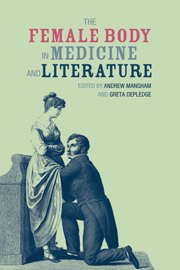Book contents
- Frontmatter
- Contents
- Acknowledgments
- Notes on Contributors
- 1 Introduction
- 2 ‘Difficulties, at present in no Degree clear'd up’: The Controversial Mother, 1600–1800
- 3 Monstrous Issues: The Uterus as Riddle in Early Modern Medical Texts
- 4 Surveilling the Secrets of the Female Body: The Contest for Reproductive Authority in the Popular Press of the Seventeenth Century
- 5 ‘Made in Imitation of Real Women and Children’: Obstetrical Machines in Eighteenth-Century Britain
- 6 Transcending the Sexed Body: Reason, Sympathy, and ‘Thinking Machines’ in the Debates over Male Midwifery
- 7 Emma Martin and the Manhandled Womb in Early Victorian England
- 8 Narrating the Victorian Vagina: Charlotte Brontë and the Masturbating Woman
- 9 ‘Those Parts Peculiar to Her Organization’: Some Observations on the History of Pelvimetry, a Nearly Forgotten Obstetric Subspeciality
- 10 ‘She read on more eagerly, almost breathlessly’: Mary Elizabeth Braddon's Challenge to Medical Depictions of Female Masturbation in The Doctor's Wife
- 11 Mrs Robinson's ‘Day-book of Iniquity’: Reading Bodies of/and Evidence in the Context of the 1858 Medical Reform Act
- 12 Rebecca's Womb: Irony and Gynaecology in Rebecca
- 13 Representations of Illegal Abortionists in England, 1900–1967
- 14 Afterword: Reading History as/and Vision
- Index
14 - Afterword: Reading History as/and Vision
- Frontmatter
- Contents
- Acknowledgments
- Notes on Contributors
- 1 Introduction
- 2 ‘Difficulties, at present in no Degree clear'd up’: The Controversial Mother, 1600–1800
- 3 Monstrous Issues: The Uterus as Riddle in Early Modern Medical Texts
- 4 Surveilling the Secrets of the Female Body: The Contest for Reproductive Authority in the Popular Press of the Seventeenth Century
- 5 ‘Made in Imitation of Real Women and Children’: Obstetrical Machines in Eighteenth-Century Britain
- 6 Transcending the Sexed Body: Reason, Sympathy, and ‘Thinking Machines’ in the Debates over Male Midwifery
- 7 Emma Martin and the Manhandled Womb in Early Victorian England
- 8 Narrating the Victorian Vagina: Charlotte Brontë and the Masturbating Woman
- 9 ‘Those Parts Peculiar to Her Organization’: Some Observations on the History of Pelvimetry, a Nearly Forgotten Obstetric Subspeciality
- 10 ‘She read on more eagerly, almost breathlessly’: Mary Elizabeth Braddon's Challenge to Medical Depictions of Female Masturbation in The Doctor's Wife
- 11 Mrs Robinson's ‘Day-book of Iniquity’: Reading Bodies of/and Evidence in the Context of the 1858 Medical Reform Act
- 12 Rebecca's Womb: Irony and Gynaecology in Rebecca
- 13 Representations of Illegal Abortionists in England, 1900–1967
- 14 Afterword: Reading History as/and Vision
- Index
Summary
Having read the fascinating collection of essays in this volume, I am struck afresh by two fundamental and enmeshed questions: how ‘history’ is produced and what that production may be seen to offer us. For what immediately became clear to me in considering these essays together is that the constitutions of the female bodies in the texts under consideration here, from early modern to twentieth century, on the one hand provide a reading of pasts which, seen retrospectively, may often seem unscientific, ignorant, or sexist compared to our present in terms of their claims to knowledge of female reproduction and sexuality; while on the other hand those problematic aspects may seem at once entirely current and pertinent to our present. I would suggest that this double effect may be attributed both, or either, to reading history as a production of the past in, and as, the present (as many thinkers have famously argued), and/or to seeing the fundamental issues around female sexuality and reproduction that are further illuminated in the essays in this volume as remaining as pressing and relevant in our present as in the pasts examined here.
For across the essays two related issues recur insistently, to my reading: first, the positions of male authority, knowledge, and professionalism in relation to female authenticity, experience, and knowledge; and second, the crucial role of vision in securing male authority over female experience.
- Type
- Chapter
- Information
- The Female Body in Medicine and Literature , pp. 216 - 222Publisher: Liverpool University PressPrint publication year: 2011



